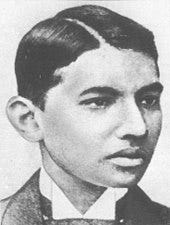Mohandas Gandhi and the Theosophists, the Plymouth Brethren, and the Ruskinites
Scene 1 – The Theosophists, London, England (1890)
Mohandas Gandhi and the Theosophists, the Plymouth Brethren, and the Ruskinites
Lately, there have been some hints and innuendoes that tend to imply that Gandhi was a Theosophist and was a part of the British Empire’s subversion of India. While I disagree with that analysis, I would like Mr. Gandhi to answer these accusations in his own words.
Scene 1 – The Theosophists, London, England (1890)
At the age of 18, Mohandas Gandhi travelled to London to study to become a barrister. Here he recounts his first acquaintance with Theosophy.
[from ‘The Story of my Experiments with Truth’, Part I, Chapter XX – Acquaintance with Religions]
“Towards the end of my second year in England I came across two Theosophists, brothers, and both unmarried. They talked to me about the Gita. They were reading Sir Edwin Arnold's translation — The Song Celestial — and they invited me to read the original with them. I felt ashamed, as I had read the divine poem neither in Samskrit nor in Gujarati. I was constrained to tell them that I had not read the Gita, but that I would gladly read it with them, and that though my knowledge of Samskrit was meagre, still I hoped to be able to understand the original to the extent of telling where the translation failed to bring out the meaning.”
[Gandhi was already acquainted with Arnold, when Gandhi started a Vegetarian Society and invited Arnold to be the vice-president, while Gandhi was the secretary. I think Gandhi was as excited to finally be able to read the Gita, as he was excited that the translation was by his friend, Arnold. The fact that the two brothers were Theosophists is incidental to his excitement about reading with them the Gita.]
“I began reading the Gita with them. The verses in the second chapter
… If one
Ponders on objects of the sense, there springs
Attraction; from attraction prows desire,
Desire flames to fierce passion, passion breeds
Recklessness; then the memory — all betrayed —
Lets noble purpose go, and saps the mind.
Till purpose, mind, and man are all undone,
made a deep impression on my mind, and they still ring in my ears. The book struck me as one of priceless worth. The impression has ever since been growing on me with the result that I regard it today as the book par excellence for the knowledge of Truth. It has afforded me invaluable help in my moments of gloom. I have read almost all the English translations of it, and I regard Sir Edwin Arnold’s as the best. He has been faithful to the text, and yet it does not read like a translation. Though I read the Gita with these friends, I cannot pretend to have studied it then. It was only after some years that it became a book of daily reading.
The brothers also recommended The Light of Asia by Sir Edwin Arnold, whom I knew till then as the author only of The Song Celestial, and I read it with even greater interest than I did the Bhagavadgita. Once I had begun it I could not leave off. They also took me on one occasion to the Blavatsky Lodge and introduced me to Madame Blavatsky and Mrs. Besant. The latter had just then joined the Theosophical Society, and I was following with great interest the controversy about her conversion. The friends advised to join the Society, but I politely declined saying, ‘With my meagre knowledge of my own religion I do not want to belong to any religious body.’ I recall having read, at the brothers’ instance, Madame Blavatsky’s Key to Theosophy. This book stimulated in me the desire to read books on Hinduism, and disabused of the notion fostered by the missionaries that Hinduism was rife with superstition …”
[Here, Gandhi says that he did NOT join the Theosophy Society, but because of his introduction to the Society, it made him want to know more about his own religion – as well as other religions, including Christianity.
It must also be remembered that while the British theosophists studied Hinduism to ‘cherry-pick’ those aspects that they found agreeable with their invented belief-structure, Gandhi on the other hand, wished to study all aspects of his religion as part of his ‘experiments with truth’ - to learn any truths behind Hinduism’s beliefs. ]
[next week, scene 2 - The Plymouth Brethren, Pretoria, South Africa (1893)]

